Tosh Berman's Blog, page 229
May 12, 2014
May 12, 2014

May 12, 2014
To be perfectly honest with you, I’m bored with drinking. I had it up to my chin with the drinking culture. I went to a couple of meetings, that is held at various churches, community halls, and even at bars, before opening time, and I am even bored with these people as well. I’m bored with the subject matter of drinking or not drinking, or even thinking about drinking. What I need to do is go to a meeting to fight my inner boredom.

It’s funny how people can remember the date and even the weather when they had their last drink. As for myself, who barely even look at a watch or a calendar, all I remember was having a bottle of red, while reading Edward Lear, and listening to Burt Bacharach’s “Make It Easy On Yourself” album. The funny thing, is when I had my third glass of wine, I started to realize that I never really liked Burt’s music. I was brought up by his melodies, due to the AM radio of my youth, but never really took his work at heart. So me sitting there, drinking the mid-price bottle of wine, it struck me that I need to give up listening to John Cage’s New York City pal, Burt, and focus more on The Small Faces, who by its very nature, spoke to me as a man more than Burt. Nevertheless, as a work of literature, I always enjoyed reading “The Big Book. ”

The writing is so-so, but what it says is quite fascinating about the human condition. Some people are turned off about the theory of The Higher Power, but I on the other hand don’t necessary see it as a black and white issue. I think the need is to be part of a family. What, who, or where is not that important, but the need to be part of something that is bigger than you is a very humanistic need, and whatever it is a religion, the AA, a cult, or even a fan club for an artist - it is the need to belong and be part of something. Most if not all humans need to be part of some version of a family. I, on the other hand, find those types of relationships boring.
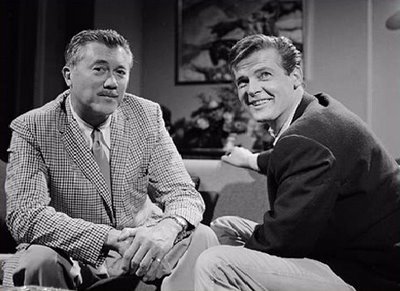
Due to my internal boredom, I have always been attracted to Leslie Charteris’ “The Saint” also known as Simon Templar. Both the TV series starring Roger Moore as well as the countless novels that I usually picked up used in various parts of the world. Mostly in garage sales and swap-meets for some odd reason. Nevertheless, I was attracted to Templar’s need for adventure. On one end, he is or was regarded as a Robin Hood figure, or in a very distant way, fighting for the good guys in the world. But what I sense in him is that he was bored, just like me, and was dissatisfied with the idea of being part of any grouping or family. Just hearing the main TV theme of the series gets my heart pumping. Also, strangely enough, watching “The Saint” I never feel compelled to have a drink, where in most cases while watching TV, I love to drink. Oddly I have no memory of the plots, either in the novels or show, but I just recall the character, and I thought if somehow I can be such a person as Simon Templar, the world will be sane and right by my standards. So in the nutshell, the two most influential men in my life are probably Leslie Charteris and Edward Lear. Lear, because he had the talent to make up nonsense words, and if nothing else in this world, if I need to be part of a larger grouping or family, then I rather it be something that deals with the word ‘nonsense.

I am also strongly attracted to the works of Joseph Beuys, but mostly due that he was a pilot in World War ll, and was shot down on the Crimson Front. He asserted that he was kept alive by the Tatar tribesmen who had his body wrapped in animal fat and felt, which eventually nursed him back to health. Animal fat and felt are the two main items in his artwork that were consistent till his death in 1986. Some say that he made up this story, but if he believed it, then I’m ok with it. I can’t bother with denying or being upset with someone’s vision of how they cope with this world. As Frank Sinatra once said “whatever gets you through the night is OK with me. ”
Published on May 12, 2014 10:08
May 11, 2014
May 11, 2014

May 11, 2014
I woke up this morning, feeling like it was a brand new day, which technically it is, and therefore decided to give up drinking. Ten minutes into my day, I realize that I was being silly, and a nice glass of vodka and orange juice to get the day properly started. There is nothing more perfect than a perfect mixture of orange juice and vodka in a glass, with ice of course, and enjoying this magnificent weather with a book of paintings by Jean-Léon Gérôme on my lap, as I try to measure my thoughts in conjunction with how many sips of the drink I am taking at that moment. The thing I like most about Gérôme’s paintings are the fact that they are really about nothing. In many ways, I feel like a tourist, in the middle of my vacation, and just letting the world soak up into my liver.

The one artist that I can’t stand, is Salvador Dali. When I look at his work, I think of him how great he is with the brush, and all that technical crap-trap stuff. Gérôme, just gives the looker the straight news, and doesn’t fuss about how wonderful he is. To this day, I can’t figure out why Dali is so highly regarded in this world. The very thought of him makes me feel cranky. I tossed the Gérôme book on the couch and went to the kitchen to prepare a second glass of my breakfast, and tried to figure what I should do for the rest of the day. Looking at the weather forecast on my I-Phone, it looks like it will be a horrible week of heat, sweat, and lack of sleeping. But today is extremely beautiful, and I want to take advantage of the morning light and the mild warmth of the sun. Therefore I looked up what movies were playing this early afternoon.
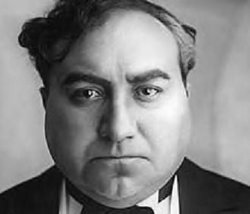
For me, the pleasure of perfect weather makes it even more better when you are in a dark movie theater, and seeing your dreams projected on a 35mm projector. Lucky me, the Cinefamily is showing a retrospective of films starring Kurt Gerron, a German actor, who was famous in the height of the Berlin film world. He stared in the original Berlin production of “The Three-Penny Opera, singing “Mack The Knife, and was also in “The Blue Angel” with Marlene Dietrich. Peter Lorre requested him to move to Hollywood, but he refused, and wanted to stay in Europe, which in hindsight, wasn’t that great of an idea, since he was gassed at Auschwitz. Nevertheless some of his films still exist, and this afternoon they’re going to show “White Slave Traffic” made in Germany in 1926, which by the way is the year that my father was born.
However, before I go, I need to call up Pete, who is in a band that I’m managing called The High Numbers. Although the band has been around for the last five or so years, I feel that they need to change their name. I was thinking of The Low Numbers, because most people identify with being in the last of the line, or losing out in the lottery - so therefore I think the change of name would be good. If I wasn’t managing him and his band, I think Pete and I would be great friends. But I have a policy in business by not being friends with your client. I need to have that objective approach at looking at Pete, and I don’t want to fall under the blanket of friendship. Also I’m having trouble with his latest song “I Can Explain.” I don’t think teenagers want to hear someone explaining something to them. My god the trials of me being me, and therefore a third glass of my daily medicine and then off to the movies.
Published on May 11, 2014 11:00
May 10, 2014
May 10, 2014

May 10, 2014
In theory, I don’t care for rioting, unless it was just for aesthetic reasons. The Astor Place Riot that took place in 1849, started when two famous Shakespearean actors argued who was best to play in the Bard’s plays. American actor Edwin Forrest (1806-1872 and the British actor William Macready (1793-1873) had a running feud, and both were extremely well-known actors in Shakespeare’s theater. Due to this feud, 120 were injured, and at least 25 were killed in this riot. This was the first time that in an American riot where a state militia was called in, and they actually shot into a crowd.

In the mid-nineteenth century, it was the British who dominated the American theater, and Edwin Forrest was one of the first American actors to do major roles in Shakespeare’s plays. Eventually, what was a difference of opinion regarding to input one’s culture into another, became a huge subject matter for Americans. Over time, the American theater scene started to resent the Briitsh influence over their own national theater. Over time, British actors who were touring in America had it rough with the American audience. Shakespeare in America went through every class in America during the nineteenth century. It seemed that the great populace was super aware of his work, and often various groupings would recite his work to each other, as well as his work being very much part of the pop culture of that time.

Macready and Forrest were once friends, but became enemies when the argument reached a feverish pitch in the American and British media. Forrest challenged Macready directly, by following his tour in America and doing the same plays, to show the audience who is a better actor in Shakespeare's plays. When Forrest went to London, to see Macready play “Hamlet, ’ he hissed at the British actor from his seat in the audience. Macready commented that Forrest 'lacked taste." When Macready came to America for another tour, he faced hostility from the audience. There was even a report that someone in the audience threw the carcass of half a dead sheep on the stage, while he performed on stage. Around the same time, Forrest proceeds with a divorce against his British wife for immoral conduct, but the verdict came down against Forrest on the same day that Macready came to New York City.

What is set-up here is a major difference between the British and American sensibility, especially in New York City. Forrest was quite popular with the gangs of New York, where he performed Shakespeare at the near-by Bowery Theater, which catered to a working-class audience. The Astor Place Opera House was built for the upper-class who didn't want to associate themselves with the lower or middle-class theater audience. Shakespeare appealed to both classes, but Forrest gave it an "American" spin, while Macready did of course, a more British subdued style. Either by chance or design, on the same night and the same play, "Macbeth," Macready had his performance at the Astor Place Opera House, and Forrest did his "Macbeth" at the Bowery Theater, a couple of miles away. During Macready's performance, a group of fans of Forrest, purchased tickets to the upper balcony of the theater and threw rotten fruit towards the stage while he performed. Meanwhile at the Bowery, when Forrest recited Macbeth's line "What rhubarb, senna or what purgative drug will scour these English hence,?" the crowd stood up and roared their approval.
When Macready appeared for his next appearance at the opera house, the riot exploded. There were at least 10,000 people outside the theater. About 21 to 31 rioters were killed and approximately 48 were wounded. At least 70 policemen were injured as well. Nevertheless, during the rioting, even as people were trying to burn down the theater, Macready did his full performance and then disguising himself, left and escaped from the crowd. The most interesting observation I have read about the riot is that Sigmund Freud commented that the theater goers "rioted over whether "Hamlet" should be a feminine or masculine character." At this point and time, history hasn't told us yet, regarding that burning question.
Published on May 10, 2014 13:54
May 9, 2014
May 9, 2014
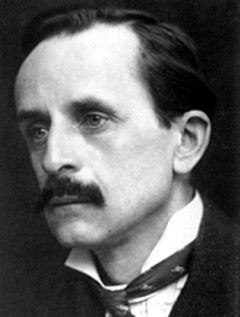
May 9, 2014
I was reading a biography on J.M. Barrie, the author of “Peter Pan, ” and the origins of that narrative is highly interesting. His mother took over her deceased mother’s household when she was eight, and therefore probably didn’t have a normal childhood. Many years later, when Barrie was 6 years old, his older brother, David, was killed in a skating accident when he was 14. David was the mother’s favorite child of the eight children that she gave to the world. The one thing that made her happy was that David will never grow older and therefore never leave her. She would dress Barrie in David’s old clothes, and he would even whistle a tune that David did when alive. An existing passport exposed that J.M. Barrie, as a grown adult, was only 5 feet and two inches. Charles Baudelaire wrote that "Genius is no more than childhood recaptured at will." Barrie, without doubt, had an understanding of the nature of children and how they see the world through the point-of-view of being reconciled with adulthood.
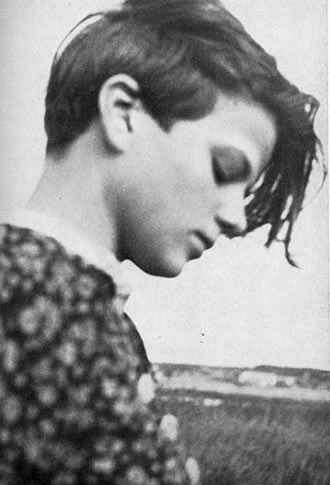
On the opposite end, Baldur von Schirach wanted to squash childhood for the “state” or empire that was therefore the theory of the National Socialist German Worker’s Party. His “Hitler Youth” basically was a nightmare version of the Boy Scouts (which, to be fair, have their own issues), but its only mission was to train youth to be adults in the Nazi idea of being citizens of the empire. Schirach encouraged bullying, spying, and any group that uses the motto Blut ind Ehre (“Blood and Honor”) you know is very far away from the theory of Barrie, regarding lost childhood. It is taboo to mess with a child's innocence, but one wonder if such innocnece really exist in the first place. The world in front of us, is anything but innocent, and I think children are wise to the fact that there are numerous worlds operating at the same time. It now comes to mind, the movement behind the White Rose, which was a non-violent German resistance to Hitler and his regime. The beautiful (in a sense, my Wendy) Sophie Scholl was a member of the White Rose, and eventually she was caught and executed by the Nazis. She died when she was 21, and I often think that is such a crucial age where youth turns into an adult. Like what the Nazis did to its own youth, they also killed its one bright light, and therefore it is a beauty that can’t die for me.
I know, as a fact, that I was afraid to grow up, because I realize that childhood for me was a sense of protection. When one came to a certain age, the world becomes real, sometimes horribly real. It is luck, and the narrative of history, that I didn't have to go to the Vietnam war. The draft got pulled back just as I reached the age of 18 years old. But I clearly remember the anxiety of the thought of turning 18, and what that would entail for my life at the time. "Peter Pan" had a special appeal for me around the age of 16.

On one end, I wanted to have a life that was similar to Gabriele D’Annunzio. I didn’t like the war part, but I loved the thought of him as the King of decadents, and I even admired his ‘dandyish’ take on warfare. The Vietnam war to me, seemed very un-dandy like, and therefore turned me off on military aesthetics or anything that go into the war machinery. But I did admire that D’Annunzio wrote poetry as a teenager, and his interest at that time in promoting Italian irredentism, which was a nationalistic approach to Italy, where the unification of Italian speaking peoples and territories deemed to be Italian lands. Bear in mind this is a teenager's view of the world, and my admiration for him is only skin-deep. When the world lacked romance at such a young age, one tends to be pulled by a figure like D'Annunzio, who didn't honestly seem to bring a promise, but more to the fact that he will burn as he moves closer to the sun. Nevertheless one enjoys the thought of heading towards the Sun to challenge its might.
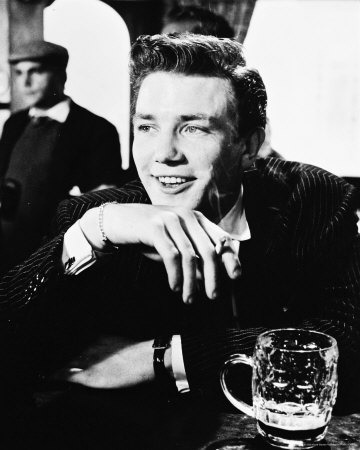
The truth is childhood slowly or quickly turns into Albert Finney’s fascinating character, Arthur Seaton, in the film “Saturday Night and Sunday Morning,” who is a young machinist at a Nottingham factory, and slowly sees the world of his youth turn into an adult nightmare. He rebels against the world by drinking and fucking on the weekend, but by the rules of the culture, he must serve as a tool in the work-week. Eventually to follow the footsteps of his parents, in other words, older people to do what they have to do to live in a world that is so far away from childhood. Also I admire another British writer, Alan Bennett, whose play "The History Boys" captures the twilight years of young turning into old. As I approach my older age, I think in all honesty, I prefer the world of Peter Pan and Neverland. I enjoy the thought of youth, but I wish to be 'adult' about it.
Published on May 09, 2014 12:12
May 8, 2014
May 8, 2014
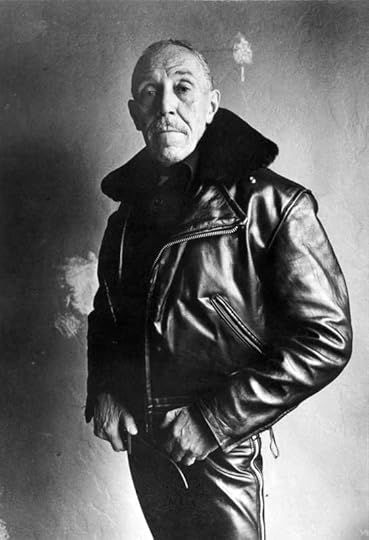
May 8, 2014
The beauty of Tom of Finland is that he doesn’t exist to me. What exists is in his world. Wittgenstein wrote that ‘the limits of my language means the limits of my world.” Tom of Finland had set a strict boundary where there is his world, and then ….Nothing. For those in the nothing, we wander into his world, and therefore we have everything that we can possibly want or hope for.
As a heterosexual, I am disappointed that my world is not so closed off as his utopia that is expressed in Tom of Finland’s art. I’m not even sure if it is even ‘art’ as we know it, but more of a self-expression that is acceptable to the few and only for the few. Which to me is the definition of utopia. What I like about Tom’s work is that it is not explicit in action, but more by a thought of something erotic will happen. The voyeur aspect of his work is part of taking a walk in the woods, and as we all know the deep forest is a walk through a sexual landscape.
There is a beauty of “the mystery” that is reflected in his work, but maybe it is only a ‘mystery” to me, because I don’t share that specific sexuality. I can admire Eric Stanton’s cartoons of heterosexual bondage and fetishism, but it's not erotic to me. Tom of Finland is erotic. The way he portrays nature as serving the erotic is among the images that gives me so such pleasure. The locations are sometimes in the imaginary west or in a park, perhaps, which due to its very nature is an erogenous zone. I think any area where nature is cut-off from the world is of course a fetish territory.
As a teenager I would go to the renaissance faire, that usually took place in some rural area outside of Los Angeles. What I loved was going with girls who I went to school with, but once in the faire, they become downright erotic objects to me. At first I thought it was their clothing, which was to imitate the 14th century, but no, it had more to do that all of this was taking place in nature. The girls weren’t the one’s that arouse me directly, but the fact that they were enclosed in that environment.
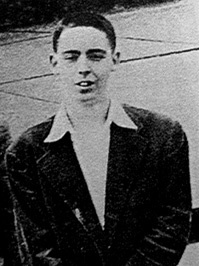
The fiction of Thomas Pynchon, on the other hand, even though one gets a clear picture of the location in his work, it is rarely, if ever erotic. When I read his works, I feel like a child entering a three-story toy store, and everything looks fantastic and I want it all. Tom of Finland doesn’t offer everything, because his world is very closed, and so was the renaissance faire. I really wanted those girls, but only, in that space and a specific time.
Perhaps it is only a matter of control, and allowing certain aspects or parts of that control to slowly be released over a period of time. Time to me is also erotic. Due to the fact that schedules and deadlines have a certain amount of pleasure and pain attached to the process. When I see a Tom of Finland drawing, I am not aware of time foresee, but I’m conscious of its absence, which makes me think of time. Which, of course, is erotic to me.
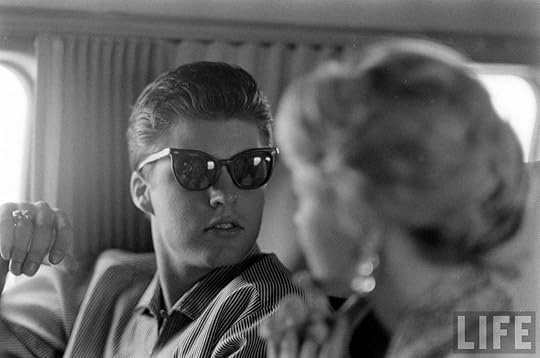
As a child, I would watch “The Adventures of Ozzie and Harriet, ” mostly due to their son, Ricky Nelson. The show is totally boring to me, but the odd thing is when Ricky sings, it becomes another world that is totally blocked off from the rest of the show. It makes sense as a narration in the show, but whenever I see Ricky singing in the context of the series, I feel he’s in another space or world than his parents or anything else on that particular TV show. Which got me thinking that perhaps he has another life that is not expressed on that series. When I see pictures of him, his eyes have a tendency to tell another tale. Something mysterious, dreamy, and sensual. I do carry a passport that will enable me to visit other countries, but what I really desire is a document of some sort that will allow me to visit ‘areas’ that I fantasize. I wish to travel with Robert Johnson, and with him as my guide, I want him to lead me to that fork in the road. With anticipated hope, he will push me towards a specific direction.
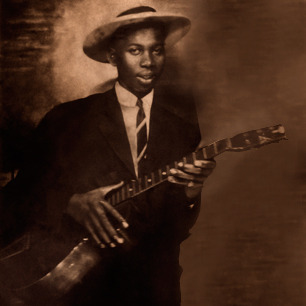
Published on May 08, 2014 13:07
May 7, 2014
May 7, 2014

May 7, 2014
The one thing that really rubs me the wrong way is that I don’t live in a palace. I loathe small apartments or houses. What really makes me sick to my stomach are those who take pride in their little shacks and fix-em-ups. My ideal address to live would be the Palace of Versailles. To enter the main entrance and hear Beethoven’s beautiful Ninth Symphony as you walk in, and having a servant greeting you at the door, well, that is heaven.
I don’t live in such an environment due to finances that are no longer in my control. Basically I worked my whole life in retail. I generally don’t understand why someone who works 40 hours a week, cannot have their dream palace. Of course, running a home like Versailles would be awfully expensive, but still, to be in a position to wander from hallway to room to hallway, like forever, is a dream that is in my head.

Since I don’t sleep that well, more likely I would take walks in the garden of Versailles. The only thing I would add to the garden is statures of saints, or at least saints that are part of my life. Jerry Nolan of the New York Dolls, Johannes Brahms, film director Ishirō Honda, author Angela Carter, and my favorite western movie sidekick, Gabby Hayes.

As I write, the tears in my eyes are clouded over my sight, yet in my heart I can see that I deserve a better place. Right now I’m writing a memoir and the only location where I feel comfortable to write such a book is at the Los Angeles Downtown Library on fifth and Flower. It is not exactly like the Versailles, but for me, I have never been in a large decorative building before. I try to imagine that I live here by myself, and often have fantasies what it must be like to roam through the rooms here at 3 A.M.

Homes like the Downtown Library and Versailles totally turn-off the world outside, which on a daily basis is a world that is not to my liking. I’m also fascinated that none of the bathrooms in the library have mirrors. It is like one cannot reflect on one’s appearance, but instead, you reflect oneself on the architecture and books that are located in the library. The mirrored halls of Versailles were made to follow up on oneself as you walk down the hallway. But here, I only have my imagination at work, and therefore the perfect location to work on my masterpiece.
Published on May 07, 2014 10:06
May 6, 2014
May 6, 2014
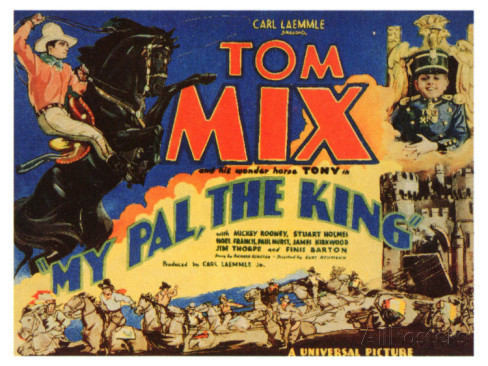 May 6, 2014
May 6, 2014When Orson Welles was working with the Mercury Theater in New York City, he was approached by the Hollywood producer Carl Laemmle to do a quickie b-movie western called “My Pal, the King.” The plot of the film, written by Welles, is about a boy, played by Mickey Rooney, who is a king from a European country who comes out west to meet real cowboys at a traveling circus. Eventually hiding his identity he joins the circus. Meanwhile, the count from that mysterious European country decides that he wants the king to disappear for good, so that he and his family can take over the country.
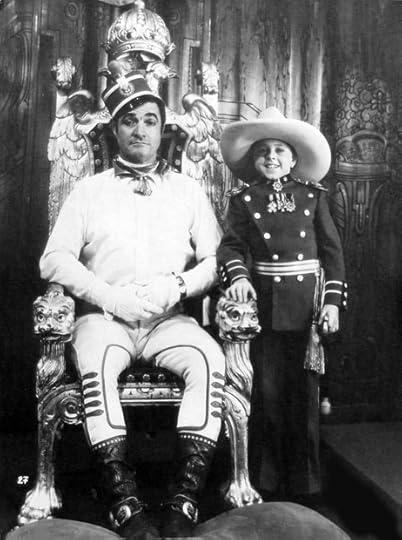
The casting was set by Laemmle, with Tom Mix playing the head of the circus, Hank Darnell playing his side-kick (who is actually a real cowboy who knew how to do rope tricks), and James Kirkwood, who worked on many films with Mary Pickford, and rumored to be a very close friend of Rudolf Valentino, as the evil Count DeMar. Welles brought in Rooney as the star, who early that year, saw him play Puck in Max Reinhardt’s film production of “A Midsummer Night’s Dream.”

Laemmle gave Welles a strict budget to do the film, and mostly it was going to shot in New Mexico. Everything was going perfectly fine, till Welles came up with the idea of telling the whole narrative through the eyes of the little King. Not only that, but he wanted the camera to represent how the king sees the world at the time. So in a lot of scenes you hear Rooney’s voice, but not his face or his body. To add a certain amount of visual menace to the film, Welles hired Ernst Ludwig Kirchner, a German expressionist painter at the time. He came up with the idea of painting the rocks in the New Mexico landscape black. Which gave the environment an eerie almost Mars like look of the place. Welles didn’t want a naturalistic or place New Mexico in a realistic light whatsoever. At the time, Welles was going through a period in his life when he was obsessing over the writings of Sigmund Freud. He felt “My Pal, the King” should be told in a subjective style, than the original routine objective approach that was to be found in the script.

When Laemmle saw the rushes, he flipped. He took a train from Los Angeles to Sante Fe to fire Welles personally. Once Welles was gone from the film set, Laemmle brought in the director Kurt Neumann, to finish off the film, using a new script by Thomas Crizer, who was employed with Harold Lloyd. Welles, of course, was upset. With the Mercury Theater, he was a king, and wasn’t was often treated in such a harsh manner. He didn’t always want to think about it, but he must have realized that his vision will be for the rest of his life, a battle between how he sees the world, and how the world sees Orson Welles.
Published on May 06, 2014 09:43
May 5, 2014
May 5, 2014

May 5, 2014
People understand me so little that they do not even understand when I complain of being misunderstood. One thing I realize is that I need to be clear about “what am I to do,” not “what I must know.” What I do know is that what I write in my journal, much of what I have simply jotted down carelessly, would become of great importance and have a great effect; for then people would have grown reconciled to me and would be able to grant me what was, is my right.
I met a woman many years ago, that I wished to marry. But due to my melancholy I decided this wasn’t a good idea for her or me. I needed the space to roam with my thoughts. I think truly I’m the most happiest when I leave my house, and at that point, I decide if I should go turn to my left or right. I tend not to take an interest in getting to a certain place, but more interested in the journey getting there. And ‘there’ usually becomes a forgotten goal within 20 minutes of my walk. So being in a relationship is very much of a narrative structure where one leads to another, in a normal fashion. But I can’t possibly follow such a narrative, because all my life I have been drawn to a world where chance takes prominent place in how and why I do things.
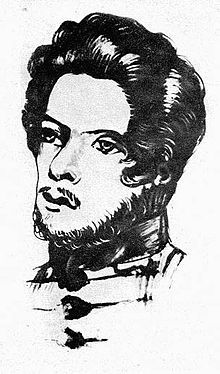
“How should I live?” is the first sentence that comes in mind when I wake up. I’ve been working off and on a novel that I can’t finish, “Scorpion and Felix, ” which so far, is about three characters and their quest to uncover their origins. I toil for at least three to four hours a day on this novel, and so far I haven’t gone beyond fifty pages of notes, and one finished paragraph. The disappointment I feel on a consistent basis takes a lot out of me, and now considering to give up this book, and focus on writing philosophy. While I was having my lunch at Café de la Régence, I ran into an old friend, Fred, who suggested that I should go with him to see “The Mark of Zorro, ” which is on a double-bill with “Nightmare Alley.” My original plan was to come back home after lunch to work on “Scorpion and Felix,” but realized that my impulse was to go to the movies. As I sat there with my friend in the darken theater, I pretty much paid more attention to my thoughts than watching the movie.

As the images of “Nightmare Alley” appeared in front of me, I chose to follow my instincts and not allow myself to follow someone else’s instincts or thoughts. The role of fate in one’s life is very important. And the way I look at fate, I regard it as a throw of dice against a movie screen, where I will follow the numbers, if not pre-planned. As a kid, I watched a TV show called “Sugarfoot, ” which made a huge impression on me.

The main character, Tom Brewster, is an Easterner who comes to the wild west to become a lawyer. Due that he doesn’t have an ounce of cowboys skills he is called by the local population “Sugarfoot.” In each episode he uses his intelligence against those who carry guns, and in his mild manner, wins the day. I was attracted to the actor who played Tom, due to his beauty, but also the fact that he was so non-wild west looking. If somehow I can bring that to the art of writing, I will be ahead of the game.

When I watch my current favorite TV show, “Mad Men,” I’m struck speechless watching Pete committing the same mistakes, due to a lack of vision, that he clearly ignores within himself, but I get the feeling he’s not following his instincts, but is totally part of his world on Madison Avenue, and therefore ’stuck’ in the role of his own making. So yes, one can wonder, once I leave the house, if I will turn left, right, or go straight ahead.
Published on May 05, 2014 12:31



